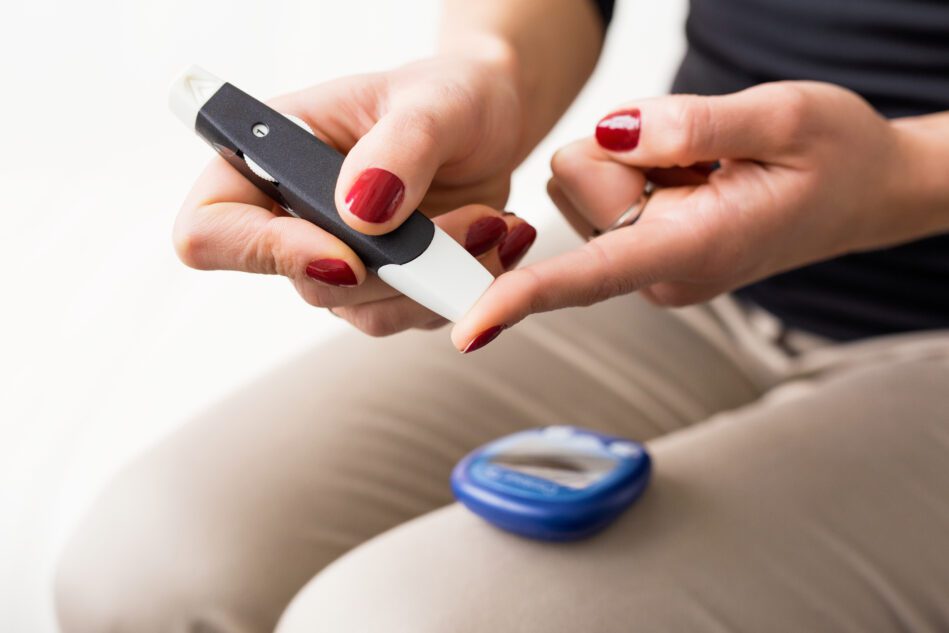From alcohol, to over-the-counter meds and herbal supplements, find out what substances and scenarios people with diabetes need to be aware of and they can be serious complication of diabetes.
If you have diabetes, you probably know all about how food affects your blood sugar, including what, when, how often and how much you eat. Skipping meals, for example, can be a clear recipe for disaster, and overdoing starchy foods can cause glucose to soar. There are several other substances and scenarios that you may not be aware can cause dangerous dips (hypoglycemia) or spikes (hyperglycemia) in your glucose levels. Some experts weigh in so you can learn more about these risks and make sure you don’t end up in any danger.
6 Unique Complications of Diabetes to People:
1) Over-The-Counter Meds
While most OTC drugs are generally safe for use with diabetes medicines, there are a few that can pose risks and interfere with your medications. Aspirin or other nonsteroidal anti-inflammatory drugs (NSAIDs) and acetaminophen can lower blood sugar, though it would take large quantities to have that effect, and other OTC meds can drive glucose up. People with diabetic kidney disease should avoid NSAIDs, since these drugs have been associated with kidney failure. Even at OTC doses, NSAIDs should be used with caution.
“The most common offenders are the allergy and decongestant products, which include pseudoephedrine or other decongestants that can increase the blood sugar level in a person with diabetes,” according to Kevin M. Pantalone, DO, an endocrinologist and director of diabetes initiatives at the Cleveland Clinic. Some cough syrups can also boost glucose because they contain sugar. Again, standard doses are unlikely to make a big difference, but “if this is a real concern for a particular patient, a sugar-free cough syrup could be purchased instead.”
2) Prescription Drugs
“The medications that patients really need to be concerned about raising their blood sugar levels are steroids such as prednisone or dexamethasone,” says Pantalone. “It is not unusual for patients to receive an injection of a steroid into a joint for pain relief, for example, only to then notice their blood sugar levels spiraling out of control the next day.”
The steroid medication dexamethasone was shown in studies published in JAMA and The New England Journal of Medicine to reduce deaths in hospitalized patients with COVID-19. If a person taking a diabetes drug is treated with dexamethasone for COVID-19, the amount of dexamethasone might need to be adjusted.
The injectable and oral varieties of steroids tend to have the largest impact, but inhaled and topical steroids can also have glucose-raising effects. Steroids are typically prescribed to treat conditions including asthma, inflammatory bowel disease (Crohn’s disease, ulcerative colitis) and joint/muscle diseases, such as rheumatoid arthritis. To avoid a potential emergency, alert your physician if you have been or will be prescribed steroids.
Antibiotics, most commonly Avelox (moxifloxacin), especially the class called fluoroquinolones, can cause significant glucose fluctuations in either direction, leading to hypoglycemia in some people and hyperglycemia in others. In 2018 the Food and Drug Administration (FDA) released a safety announcement strengthening warnings about blood sugar fluctuations with fluoroquinolone use, and required the drugs’ manufacturers to add the risk of life-threatening hypoglycemia leading to coma to their drug labels. Doctors can help alleviate these risks by adjusting the dose and duration of therapy with fluoroquinolones.
Diabetes medications may interact with drugs taken for hypothyroidism (underactive thyroid). For example, if you take metformin for diabetes and you also take Synthroid (levothyroxine), you may risk reducing your level of thyroid-stimulating hormone (TSH), which affects thyroid function. Insulin or sulfonylureas for diabetes may become more or less effective when taken with Synthroid.
Women with diabetes may be at greater risk of side effects from oral contraceptives (OCs) and should be followed closely by a medical professional in conjunction with this use. Women may need to avoid OCs if they have diabetes complications, such as heart, kidney or eye problems.
Other prescription drugs that may increase blood sugar levels include cholesterol-lowering statins and certain blood pressure medications including beta blockers, thiazide diuretics and others. However, blood sugar increases are small with many of these, so doctors need to weigh their potential benefits against possible risks when considering prescribing them.
3) Dieting
Diabetes meds reduce blood sugar regardless of how much or little food a patient is eating at a given time, explains Pantalone. During times of decreased appetite or limiting food intake by choice, or just skipping a meal, a person taking drugs for diabetes may experience drops in glucose that can cause levels to become dangerously low. Discuss with your doctor ahead of time how you would self-treat hypoglycemia in the event your blood sugar suddenly drops too low. For example, you might keep glucose tablets or raisins on hand to eat for a quick blood sugar boost. Also, talk to your doctor about whether changes in your medications might be necessary.
“Patients should review with their doctors which medications need to be adjusted, if any, prior to making any self-adjustments,” he recommends. “Patients with insulin-dependent diabetes cannot simply skip doses of long-acting basal insulin, as doing so could result in an emergency situation, and maintenance medications usually need to be continued, albeit often at a lower dose.”
4) Illness
While a cold medicine can raise blood sugar, the “cold itself is likely to increase glucose levels too,” says Matthew Freeby, MD, director of the Gonda Diabetes Center at David Geffen UCLA School of Medicine. People taking diabetes drugs might require a higher dosage when experiencing bodily stress caused by illness.
The disease-fighting hormones your body releases in response to the stress of illness can boost glucose and interfere with insulin. In type 1 diabetes, this can lead to a life-threatening condition called ketoacidosis, and may result in diabetic-related coma. Though less likely to affect individuals with type 2 diabetes, illness may still lead to excessive blood glucose levels in both groups.
Alternatively, some patients may need a lower dosage of diabetes medication while sick because of decreased appetite. Talk to your doc or diabetes educator about creating a “sick-day plan,” so you’ll know exactly what to do in case of illness.
5) Herbal Supplements
“Most patients don’t think to tell their clinician or pharmacist that they’re using herbal supplements because they appear ‘safe’ and natural,” notes Amy Gustafson, PharmD, community pharmacy residency director at the Cleveland Clinic. But many natural supplements can lead to too-low or too-high blood sugar levels when combined with diabetes meds, she says, including garlic, ginseng, fenugreek and cinnamon. No need to worry about the herbs when used as spices, the concern is the concentrated amounts found in supplements.
“Other agents that could interact with diabetes drugs are aloe vera, Andrographis paniculata, karela (bitter melon), gogi, St. John’s wort, herbs with isoflavones or levocarnitine,” adds Mohamed A. Jalloh, PharmD, assistant professor at Touro University California College of Pharmacy and a spokesman for the American Pharmacists Association. “St. John’s wort and ginseng are the worst because they induce the same enzyme that processes most diabetes drugs” and therefore decrease their effectiveness. However, more research is needed on the impact of these herbals on glucose tolerance, as studies on ginseng are inconsistent, and studies on St. John’s wort have also had mixed results
6) Alcohol
Hitting the sauce can mess with your meds and your glucose, though maybe not in the way you would expect. It is well-known that alcohol can increase blood sugar in small amounts, but in larger doses, it “can increase the risk of hypoglycemia by reducing the liver’s natural glucose production — and alcohol plus medication can add up to a low glucose level,” explains Freeby. “Therefore, patients taking diabetes medications should be cautious with alcohol intake and need to consult their doctor” regarding safe limits for their specific situation.
In many cases, people with diabetes can drink alcohol in moderation, but you should never do so on an empty stomach or when you know your blood sugar is already low. People taking insulin or sulfonylureas are especially vulnerable to the glucose-lowering effects of alcohol.
How to Stay Safe and Away from Common Complications of Diabetes
One of the most important ways to minimize such risks is to keep close track of all drugs you are taking, including OTC drugs and natural supplements, advises Jeff McClusky, BS, RPH, director of pharmacy outpatient operations at MD Anderson Cancer Center in Richmond, Texas. “Verify that both your physician and pharmacist have these details, and ask them first if you are looking to change any OTC or medication practices,” he says.
It is best to use just one pharmacy so that they can maintain up-to-date and accurate records, and this helps the pharmacist get to know you as a patient and fully understand the various medications you may be taking. “Having all of these details in one place allows them to provide comprehensive medication reviews every time you visit them,” McClusky adds.






